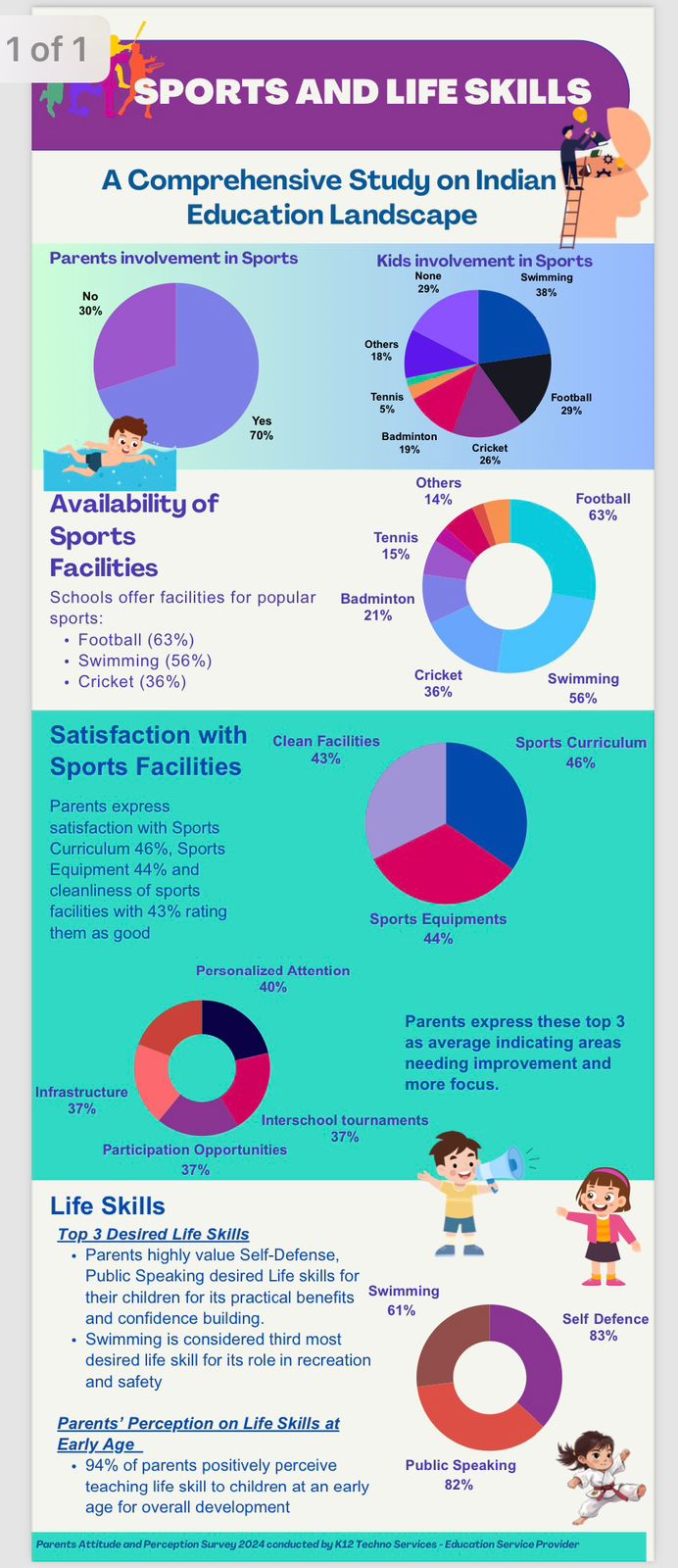
K-12 Techno Services, an education service provider, on Oct 7 released the inaugural edition of its ‘All India Parent Survey 2024 – Parents Attitude & Perception towards the Indian School Education Landscape’ highlights key disparities and parental expectations. The survey based on insights from over 3,000 parents of children from multiple educational boards (ICSE, CBSE, IB, state-level boards) across regions, reveals that an overwhelming majority of parents (94%) positively acknowledge the importance of teaching life skills at an early age and its benefits for a child’s overall development. However, an alarming 23% do not endorse such training, possibly due to lack of access, awareness, or resources highlighting the need for increased availability and awareness of life skills programs to benefit school children.
Additionally, the survey results point out key expectations among parents with overall development (58%) and academic excellence (55%) emerging as the top priorities for parents when choosing schools. The quality of teachers (48%) follows closely behind, indicating a shift towards a more holistic view of education.
Families with income below INR 10 Lakhs per annum tend to prioritize academic excellence, viewing it as a crucial stepping stone for their children’s future success. In contrast, higher-income groups (households earning INR 10-20 lakhs per annum) place a greater emphasis on overall development, seeking schools that nurture a wide range of skills and interests beyond traditional academics.
Other key findings and observations from the survey are elucidated below:
- Technology Adoption:A promising 87% of parents support technology integration in schools, recognizing its potential to enhance learning. However, home management strategies vary widely. While 46% allow moderate usage, others range from strict educational-only use (28%) to unrestricted access (6%). To balance screen time, most parents (57%) encourage non-screen activities, with others explaining risks or setting explicit limits.
- Education policies Awareness:The survey reveals 58.33% of parents have positive awareness of NEP 2020, while 41.67% lack awareness or hold negative views. Activity-Based Learning (60.47%) and Skill-Based Learning (53.44%) are the most recognized aspects. However, 21.12% of parents are unaware of any specific aspects, indicating a need for improved communication about the policy’s details and benefits.
The survey further indicates a substantial awareness of the Right To Education (RTE) Act, with 71.24% of parents familiar with this fundamental right. However, 28.76% of parents remain unaware, highlighting the need for continued efforts to educate and inform about this crucial legislation in Indian education.
- Parent-Teacher Coordination:The survey reveals a mismatch between parents’ communication preferences and schools’ practices. While 74% of parents prefer weekly or monthly updates, 40% of schools communicate daily. Parents strongly favor WhatsApp messages (50%) and Parent-Teacher Meetings (28%), yet schools primarily use PTMs (31%), parent portals (22%), and WhatsApp/SMS (22%). This discrepancy highlights an opportunity for schools to align their communication strategies with parental preferences.
- Performance of Students:The survey reveals generally positive parental perceptions of student performance. Around 47% of parents rate their children’s academic performance highly (4 or 5 out of 5). Language ability is also viewed positively, with 45% giving high ratings. Math/aptitude shows more varied results, with 30% rating it 4 or 5, but 18% rating it as 2. In peer comparisons, 80% of parents view their children as average or above. However, 18% rate their school’s responsibility in student performance as 2, indicating room for improvement.
- Socio-Political Awareness and Emotional Intelligence:The survey reveals mixed perceptions of children’s socio-political awareness. While 40.78% of parents rate it as average, 32.69% consider it below average, and only 26.53% rate it above average. Encouragingly, 49.25% of children actively engage in discussions about socio-political issues, with others showing interest through current affairs (24.38%), online news (18.02%), and newspapers (16.30%). However, 27.71% don’t engage at all, indicating a need for enhanced socio-political education in schools and at home.
- Inclusivity in Schools:The survey reveals a significant gap in awareness regarding inclusive education practices. Only 38.13% of parents are aware of facilities for disabled students in schools, while 12.21% report a lack of such facilities. Notably, 49.66% of parents are unaware of any inclusivity measures, highlighting a critical need for schools to improve communication about their efforts to support diverse learning needs and abilities.
- Multilingualism in Education:The survey reveals diverse patterns in third language education. While 48.63% of students don’t study a third language, 35.4% learn an Indian language, and 15.97% opt for foreign languages. The age of third language introduction varies, with 38.72% starting between 3-6 years, 28.69% between 6-8 years, and smaller percentages before 3 or after 8 years. This data suggests a preference for early language exposure, aligning with critical language acquisition periods.

The survey provides valuable insights for policymakers, educators, and school administrators. It underscores the need for a nuanced approach to education that considers the diverse needs and aspirations of Indian families. The Parents Attitude & Perception survey is a significant undertaking aiming to shed light on the critical areas where the Indian education system can improve.











